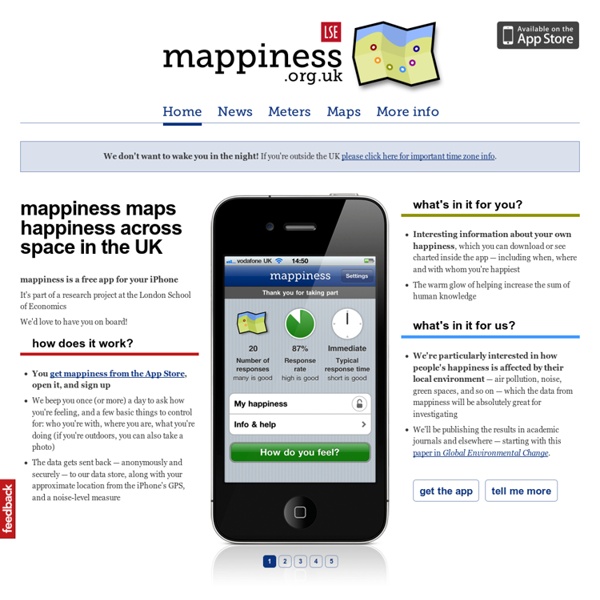



Mappiness iPhone App Maps Happiness (Say That Three Times Fast) Officially launching today is Mappiness, a UK iPhone app that “maps Happiness” by pinging users with a survey in order to plot out their feelings during the day (happiness, in this case, is apparently user-defined). Using LBS, the app links responses and response locations to environmental data in an attempt to, according to lead researcher George MacKerron, “better find answers on the impacts of natural beauty and environmental problems on individual and national well being.” MacKerron, based at the London School Economics, elaborated on the idea of tracking happiness, “In the 19th century economists imagined a ‘hedonometer,’ a perfect happiness gauge, and psychologists have more recently run small scale ‘experience sampling’ studies to see how mood varies with activity, time of day and so on.” Mappiness is the first project of its kind to add location to the mix. Now, thanks to the iPhone, we might get a better grasp on humanity’s happiness habits.
Bio Mapping The Great Location Land Rush Of 2010 Back in November, at our Realtime CrunchUp event, I sat on the geolocation panel with members of Twitter, Foursquare, SimpleGeo, GeoAPI, Hot Potato, and Google. At one point, I raised the question if location was going to be the next battleground between startups large and small, much like social identity plays (Facebook Connect vs. Google Friend Connect) and status updates (Twitter vs. Facebook). All of the panelists indicated that it wouldn’t be, because they could all get along. How sweet. I’m sure some of them would counter that because location data is fairly standard right now, and moving easily between services, all of them will win. Twitter co-founder Evan Williams writes today that “We will be looking at how to integrate the work Mixer Labs has done with the Twitter API in useful ways…” and notes that they’ll be working on adding contextual local relevancy to tweets. What Twitter likely won’t be doing is getting into the core location platform business anytime soon. Game on.
Yo soló necesito cariño entrar ¡Convocatoria abierta! Este proyecto solo acaba de empezar: 1. cariño respeto atención 2. Ejemplo: "Estoy en Almería, España, en medio de la calle, en el nº 1 de la calle Mayor. SimpleGeo Locates $1.5 Million And Many Big Name Investors There is a lot of buzz around SimpleGeo right now. The service, which participated in our RealTime CrunchUp earlier this month, also took home two prizes at the Under The Radar conference just prior to that. And that was a big deal for the company considering it won the audience award even though it’s not exactly the most consumer-oriented project. SimpleGeo has just closed a $1.5 million seed round of funding, we’ve confirmed. The two founders, Matt Galligan and Joe Stump, who are both based in Boulder, CO, used their time in San Francisco this month to close this new round. SimpleGeo is not the only company working to provide an easy way for others to tap into the location craze. SimpleGeo remains in beta for the time being. Participants in its previous debt round include Joanna Shields (formerly Bebo), David Liu (formerly AOL), Ziv Navoth (formerly Bebo), Darius Contractor (Bebo), Ravi Narasimhan (Strategic Data Corp/NewsCorp), and Jason Knapp (Strategic Data Corp/NewsCorp).
Redes Vestíveis Exhibition Space - Arte.Mov - Belo Horizonte Video Related: Arte.Mov Festival The GeoAPI Launches For Places, Tweets, Flickr Photos, And More Location, location, location. With the growing ubiquity of GPS-equipped phones, there is a virtual land rush going on right now to put geolocation capabilities in every mobile app. Today, Mixer Labs, the folks behind TownMe, introduced the GeoAPI, aimed at developers who want to add geolocation features to their apps in a plug-and-play fashion. The GeoAPI is built on top of what was previously called the TownMe GeoAPI, which offered a reverse geo-coder for lat/long coordinates and geo-database of 16 million businesses and points of interest. So a developer who wants to build their own Foursquare/Gowalla-type mobile app with check-ins and geo-Tweets can build it on top of the GeoAPI instead of assembling all the underlying data from scratch. To get a basic feeling for how this works, check out these simple demos for geo-coded Tweets and Flickr photos in San Francisco. Mixer Labs co-founder Elad Gil was the first product manager for Google Mobile Maps.
Sensory Deprivation Christian Nold May 2007 - ongoing Download a full quality PDF of the Newham Sensory Deprivation Map here The Newham Sensory Deprivation Map is the result of an intensive workshop with 36 art students from Newham Sixth Form College. The students were put into pairs, one of whom was blindfolded and given ear defenders so that they could not see or hear. The other student was given a Global Positioning System as well as pen and paper. Together these two would explore the local area around the college for up to an hour. View of the whole of the Newham Sensory Deprivation Map. Detail of the Newham Sensory Deprivation Map. --------------------------------------------------------------------------- Christian Nold christian@softhook.com All the work on the Softhook website is licensed under a Creative Commons Attribution NonCommercial ShareAlike 2.5 License unless otherwise stated on the page or in the image ALT tag.
GoWalla Worth Nearly $30 Million After Financing. Time To Make Your Move, Facebook. If you were gettin’ all antsy in the pantsies about yesterday’s launch of the LG Expo and it’s detachable projector accessory, you might be a bit bewildered right now. A full day later, AT&T’s still showing no sign of the handset. WMExperts did a bit of digging, and found out that the Expo has been delayed for at least “a few days” due to shipping issues. When this sort of stuff happens, it’s generally because a cargo ship coming from Asia had to turn around for one reason or another, or otherwise never left the port. There’s no word just yet on a new ETA for the handset – we’ll let you know if that changes.